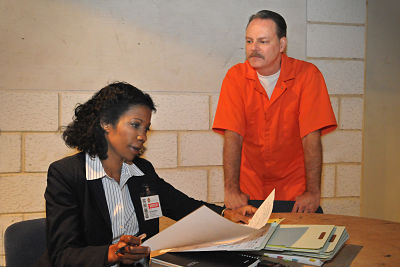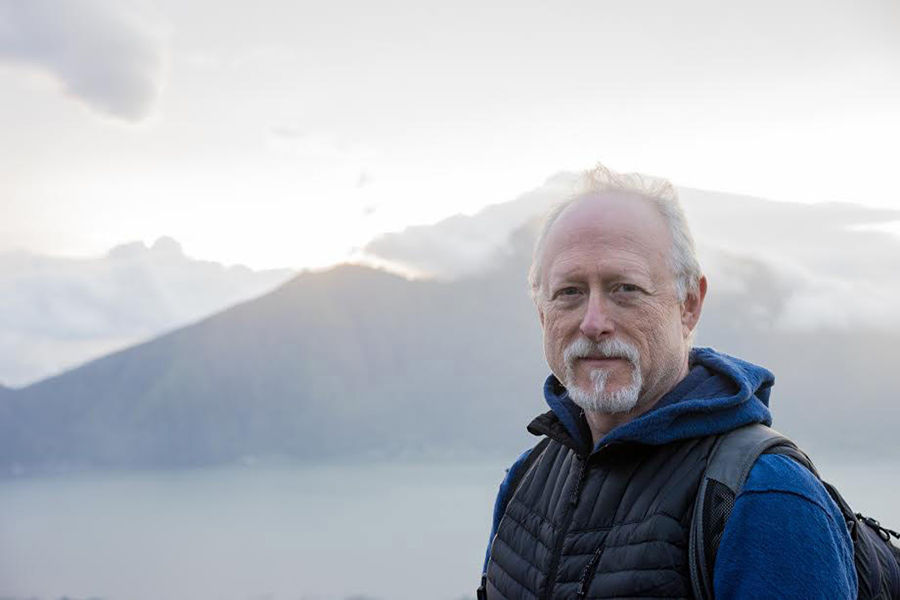How do you write a play about the Trump presidency when real events threaten to change the script seemingly daily, even hourly? In Robert Schenkkan’s case, the answer is: Get very angry and write very quickly. The National New Play Network’s rolling premiere of Schenkkan’s Building the Wall opens March 18 at the Fountain Theatre in Hollywood, the same day the two-character play will be published in hardback. Productions are also scheduled for Curious Theatre Company in Denver, Borderlands Theater in Tucson, Ariz.. and Forum Theatre in Silver Spring, Md.
Set in 2019, Building the Wall finds a writer interviewing the supervisor of a private prison who’s been prosecuted for carrying out Trump’s federal policies surrounding immigration and deportation. American Theatre spoke to the Pulitzer Prize-winning author of The Kentucky Cycle and All the Way.
How did the Fountain get the first production?
I had known [co-artistic director] Stephen Sachs for a very long time, and have always been a great admirer of what Stephen has done at the Fountain. Anywhere you can build a viable theatre and keep it running for two decades now is an extraordinary achievement, and of course the quality of the work they produce there and the life many of those plays have gone on to live has been quite impressive. So I mentioned to him in an email this new play and he asked if he could read it. I sent it to him and he wrote back almost immediately, “I love this and I have to change things around here but we have to do this and we have to do it right now,” and, God bless him, he did.
You actually wrote Building the Wall before the November election. Once Trump got into office, what parts of the play had to change?
I have not changed the script in significant ways. It’s been eerily prescient of what has actually taken place. As I inevitably do with a new play, as I continue to revise it, I deepen the characters and their relationship, but simultaneously I’m also trying to be very mindful of what is actually taking place every day on this issue—immigration, border security, deportation. That’s been unfolding at such a rapid rate, I want to fold in what seems useful and pertinent of the reality into this imagined future.

Given how quickly things are happening, did you feel under particular pressure to get this play circulating?
I think that the republic is in serious jeopardy, and I think that artists need to respond to this now, immediately. We can’t respond in our traditional methods of theatremaking. It’s no good to commission a play right now and develop it over several months and produce it 18 months from now. The moment will have passed.
Are we meant to see hope in the fact that Rick, your play’s protagonist, is being prosecuted? That there actually will be some sort of moral reckoning?
Absolutely. The play is not bleak in its ultimate message. It’s a serious look at the issues of individual responsibility and conscience. This is not a Republican or Democratic issue. This is not a blue state/red state issue. What we’re witnessing is an assault on fundamental American values, and each of us is going to find themselves—maybe more than once—at a decision point, and that decision will essentially be a moral choice. We need to be very conscious about that.
Ideally, what happens after audiences have seen this play? What are their next steps?
Certainly we want to enter the national conversation in a big way. One of the dangers we face is normalization. The tendency to normalize what is taking place right now is an extremely dangerous one and it’s really part and parcel to what we’re talking about: human denial and avoidance in the face of extremely unpleasant information. The first step is to actually make people conscious of these issues. How do we turn subsequent conversation after the fact of the production into meaningful action? We’re talking about how to focus conversations and get people interested in action and in what groups they might want to investigate, how to become more involved in the political process right now.
What are the hopes of the play’s future past the first four NNPN rolling world premiere productions?
I’m trying very much to roll this out in as fast and expeditious a way as possible. There’s no holdback on the play, and you just never do that—you’re always holding the play back hoping to get the big regional theatre. No. You want to do Building the Wall? God bless. Go do it. I don’t care how big you are, how small you are, where you are, rural or urban, blue state, red state, it doesn’t matter. You want to do this? Great. You want to do a reading of it? That’s great, too. The point is: Seize the moment. Do it now. Get it out there. Then within that, we are also exploring a wide variety of simultaneous methods of distribution.
For example?
What if we encouraged everyone who wanted to to do a reading during the same 24 to 36 hours? Then you’re no longer just a small theatre in Alpine, Texas doing a reading. You’re one of 80 or 100 theatres or community groups or political action committees who are reading this simultaneously. Now you’re part of a movement. You’re part of a community. Another idea is we create touring companies that come to theatres that only have their dark Monday or the weekend between when they move one show out and another show in. I built this thing to be very portable—two actors, a table and two chairs. You could send this out on the road with two actors, a stage manager and an Apple laptop with sound and light cues, and there’s your show. That comes in at a very reasonable price point.
There are people at the larger theatres who are saying to us, “Gosh, I really love this and would really like to do it, but we’re already into our season, and we can’t change our schedule.” I have a little bit of attitude about that. I feel like, “Okay, guys, it’s the last days of the Weimar Republic. Are you really worried about inconveniencing your marketing department?” But that’s easy for me to say, because I don’t run a theatre and I don’t have a staff of 40 or 60 people whose jobs depend on decisions I make.


